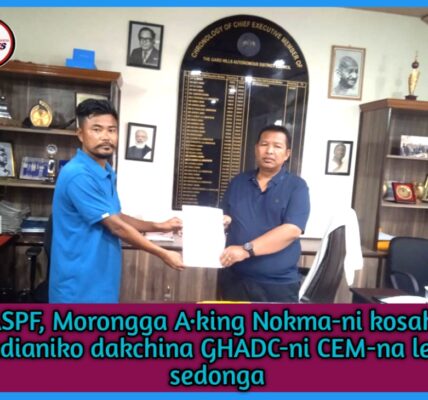Representation for Equitable Recognition of Khasi and Garo Languages:Cherian
Tura, Mar 4,2025: Social Activist Cherian G. Momin, submitted a memorandum to Chief Minister Conrad Sangma to address the recent move by Paul Lyngdoh, Minister of Arts and Culture, in pursuing the elevation of the Khasi language as an official language of Meghalaya alongside English and to appeal for equal recognition of the Garo language in alignment with the foundational principles of Meghalaya’s statehood.
Meghalaya, carved out of Assam on 21st January 1972, emerged as a beacon of hope for the three indigenous ethnic communities the Khasi, Garo and Jaintia. The birth of the state was not merely an administrative division, but a testament to the collective aspirations of our forefathers, whose vision was to preserve and promote the distinct linguistic, cultural and social identities of the indigenous communities.
The struggle for statehood was fuelled by the unwavering efforts of leaders and freedom fighters such as Captain Williamson A. Sangma, Salseng C. Marak, Hopingstone Lyngdoh, B. B. Lyngdoh and Professor GG. Swell, among others. Their vision was not to establish a state for one
community, but a harmonious land where the rights, languages, and cultures of the Khasi, Garo and Jaintia people would be equally respected and preserved, said Momin.
It was this vision that guided the constitutional recognition of Khasi and Garo as associate official languages of Meghalaya under the Meghalaya State Language Act, 2005, with English serving as the official language for government communication.
The recent initiative by Paul Lyngdoh to upgrade the Khasi language to an official language of Meghalaya and seek its inclusion in the Eighth Schedule of the Indian Constitution is indeed a commendable step toward the preservation of linguistic heritage. However, this move, if pursued without corresponding recognition of the Garo language, risks creating a divisive precedent that undermines the principles of equality and mutual respect enshrined in the state’s founding ethos.
While the Khasi language holds profound significance for the Khasi community, the Garo language represents an equally rich cultural legacy of the Garo people. The Garo language is not only a means of communication, but profound expression of the Garo people’s history, folklore and oral traditions, passed down through generations,added Momin.
The exclusion of the Garo language from the current discourse on official language status would not only be a violation of the right to equality under Article 14 of the Indian Constitution but also an affront to the collective vision of our statehood leaders.
It is pertinent to highlight that the Indian Constitution under Article 29 guarantees the protection of linguistic, cultural and educational rights of minorities. Furthermore, Article 14 ensures equality before the law and prohibits arbitrary discrimination. The elevation of one indigenous language over another would amount to a selective recognition that could polarize the harmonious relationship between the two major communities of Meghalaya.
Additionally, Article 347 empowers the President of India to recognize languages spoken by a substantial proportion of the population as official languages of the state. Both Khasi and Garo languages, by virtue of their historical, cultural, and demographic significance, meet the constitutional criteria for such recognition.
According to the latest census reports, the Garo community constitutes approximately 31% of the total population of Meghalaya, while the Khasi Jaintia communities make up 48%. The Garo language is widely spoken in five districts of Garo Hills and is an integral part of the socio-cultural life of the people. Therefore, any move to grant official language status to Khasi without extending the same recognition to Garo would be an unjustifiable neglect of a substantial segment of the state’s population, Social Activist.
The true strength of Meghalaya lies in its diverse linguistic and cultural mosaic. Any policy that seeks to promote one community at the expense of another would betray the sacrifices of our statehood leaders and threaten the social harmony that binds us together.
It is the bounden duty of the present leadership to uphold the legacy of Captain Williamson A. Sangma, B. B. Lyngdoh, and other visionary leaders by fostering a governance model that embraces equity, inclusivity, and justice.
By granting equal official language status to both Khasi and Garo languages, Meghalaya will not only honour its constitutional obligations but also reaffirm its commitment to the principles of communal harmony and democratic fairness.
“I trust your esteemed leadership to consider this appeal with the gravity and urgency it deserves and ensure that the linguistic aspirations of both Khasi and Garo communities are equally safeguarded” said Momin.
![]()





